Senate
Latest

Senators ask Alphabet how it will protect COVID-19 screening site data
Alphabet's COVID-19 screening site might serve as a relief to those eager to determine if they need to get tested, but it's also raising some privacy concerns in Congress. Five Democratic senators have sent letters to Vice President Mike Pence and Alphabet chief Sundar Pichai asking if they've studied the potential for privacy and security holes in Verily's Baseline triage system. The politicians wanted to know if users will be asked to "forfeit" their data to participate, and if Google will be barred from either using the data for its own purposes or selling it to third parties.

Washington state approves stronger facial recognition regulations
Washington officials have approved a set of stronger facial recognition regulations for the state. Members of the state's House of Representatives and the Senate have reached a final compromise on the rules designed to regulate the use of facial recognition. Since Washington often leads the way in tech-related laws -- it was the first state to pass its own net neutrality law -- this sounds like an auspicious development for privacy advocates across the nation.

Senate approves $1 billion budget to help rural carriers replace Huawei gear
The US Senate has unanimously approved a bill that would give rural carriers access to a $1 billion fund meant to help them remove and replace Huawei gear. According to The Wall Street Journal and TechCrunch, the Senate has voted to send the bill to the President a couple of months after the House approved its own version. If Trump signs it -- and a previous Politico report said top administration figures expressed their support for it -- then 40 rural carriers currently using equipment from Chinese tech giants like Huawei and ZTE will have access to the fund.
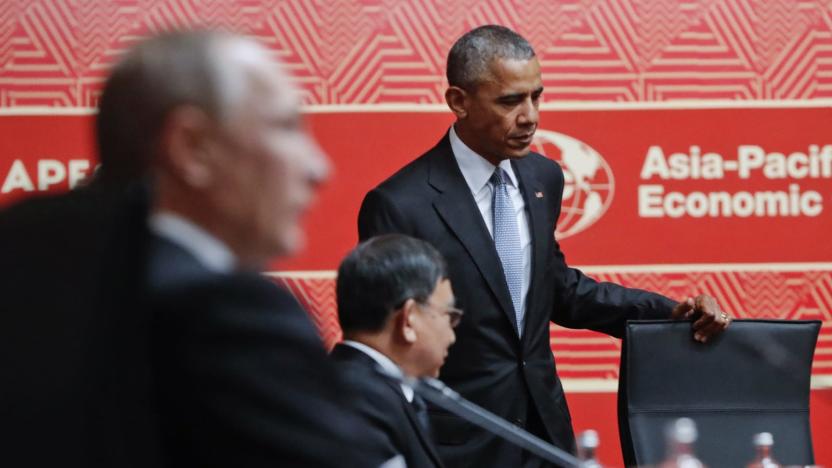
Senate: Obama Admin. wasn't prepared to handle Russian interference
Today, the Senate Select Committee on Intelligence released a report (PDF) detailing the Obama administration's response to Russia's meddling in the 2016 election. The report says the Obama administration was not well-prepared to handle the unprecedented election interference and that the administration suffered from "paralysis of analysis."

Senator calls on Tesla to make Autopilot safety changes
Tesla's Autopilot driving assist technology has come under fire over safety concerns, and now a US politician wants changes to put drivers' minds at ease. Senator Ed Markey has issued recommendations for Autopilot changes after Tesla both answered questions about the semi-autonomous system and met with him. For one, Markey agrees with those who want Tesla to change Autopilot's name -- he believes the company should "rebrand and remarket" the tech to make clear that it's not a full self-driving system and "cannot replace" human drivers.

Former Google exec says he was pushed out for defending human rights
Google's former global head of international relations claims he was pushed out of the company for trying to protect free expression and privacy in China. In a letter shared today, Ross LaJeunesse says that, after 11 years of working to protect human rights in China, he was told there was no longer a job for him as a result of "reorganization." He says the company has strayed from its "don't be evil" motto, and rather than take a lesser role, he's leaving to run for a Senate seat in Maine.
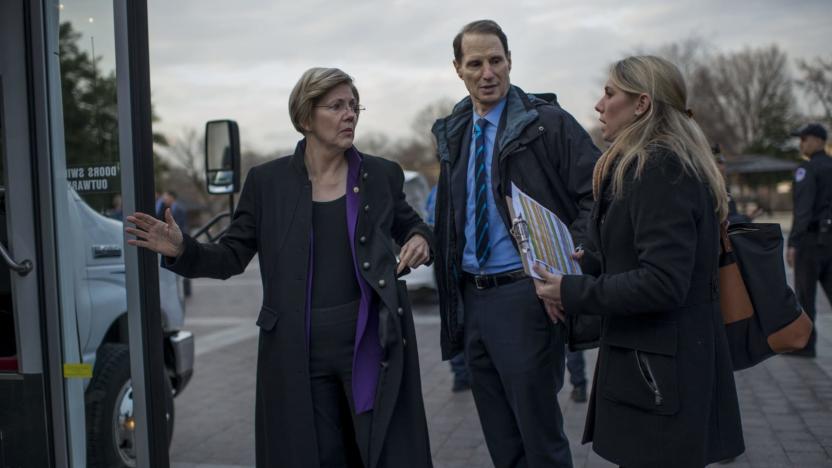
Congress worries sale of .org could harm non-profits
Control over the .org internet domain is close to changing hands, and American politicians aren't happy. Senators Richard Blumenthal, Elizabeth Warren and Ron Wyden have joined Rep. Anna Eshoo in sending a letter demanding answers over the Internet Society's sale of .org and the Public Interest Registry (which manages the domain) to a private equity firm, Ethos Capital. The congresspeople want everyone involved to both outline how transparent they'll be as well as assurances that they'll keep the domain accessible, neutral and safe for non-profits.

Congress approves the TRACED Act to fight robocalls
Today, Senate approved the TRACED Act, or Telephone Robocall Abuse Criminal Enforcement Act. The legislation could give the government new powers to prosecute robocallers, The Washington Post says. It would also require carriers that authenticate and block spam callers to share those services with customers for free.

Democrats want to study FOSTA-SESTA's impact on sex workers online
If you're concerned that FOSTA-SESTA seems built more to kick sex workers offline than to fight sex trafficking, you're not alone. House representatives and senators have introduced the Safe Sex Workers Study Act, a bill that would analyze the impact of FOSTA-SESTA on the health and safety of sex workers and help Congress make "informed" decisions. The politicians are concerned that banning sites from the "promotion of prostitution" only served to hurt the consensual sex industry by shutting down resources where workers could screen customers, set limits and discuss issues with their peers. This not only increased the chances for violence and health issues, but may have thwarted the very purpose of FOSTA-SESTA by pushing sex traffickers further underground.
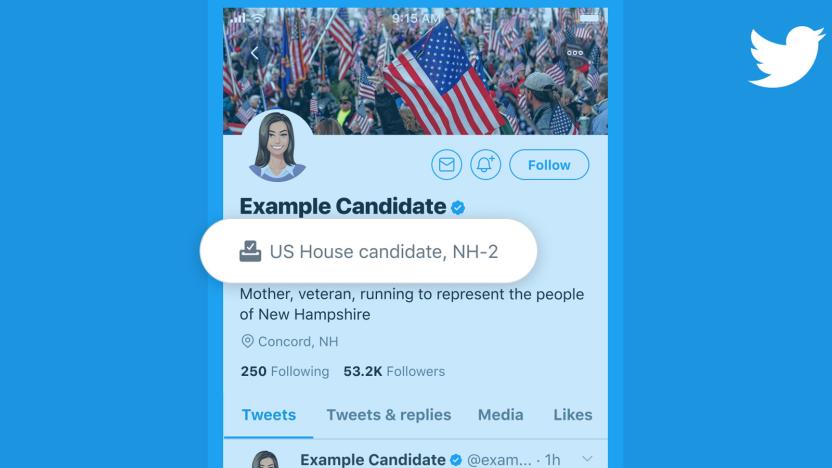
Twitter is bringing back candidate labels for the 2020 US elections
Ahead of the US elections next year, Twitter says it's bringing back election labels, a feature the company introduced during the 2018 midterms to help increase the visibility of political tweets.

Sen. Schumer proposes a $454 billion electric vehicle trade-up program
In a recently published New York Times op-ed, Senate Minority Leader Chuck Schumer (D-NY) has said he'll introduce new legislation if Democrats win the Senate in 2020 to help Americans trade in their gasoline cars for electric vehicles (EV). The ultimate goal of the plan is to replace every single gasoline car on the road in the US with a zero-emission EV by 2040.

Marco Rubio calls for TikTok review over censorship claims
TikTok owner ByteDance might find itself in legal trouble in the US over claims it's censoring criticism of China in other parts of the world. Senator Marco Rubio has sent a letter to Treasury Secretary Steven Mnuchin asking for the Committee on Foreign Investment in the United States (CFIUS) to review ByteDance's acquisition of Musical.ly in light of the censorship allegations. He argued there was "ample & growing evidence" TikTok was silencing US material to honor Chinese government policies, effectively letting it "suppress freedom of speech" beyond its borders.

Senate demands answers from Amazon over Ring surveillance
Ring's controversial "Neighbors" surveillance network and cozy relationship with police departments has drawn the eye US lawmakers. In a letter to CEO Jeff Bezos, Senator Edward Markey expressed concern that the system "could easily create a surveillance network that places dangerous burdens on people of color and [feed] racial anxieties in local communities."

Senators want answers from Google over Huawei's cancelled smart speaker (updated)
Huawei's Google-backed smart speaker might never have seen the light of day, but that isn't stopping politicians from asking questions about it. Republican Senators Josh Hawley, Tom Cotton and Marco Rubio have sent a letter to Google chief Sundar Pichai requesting answers about the never-announced device. They're concerned that the speaker could have served as a "listening device" for the Chinese, and that Google might have been "putting profits before country."
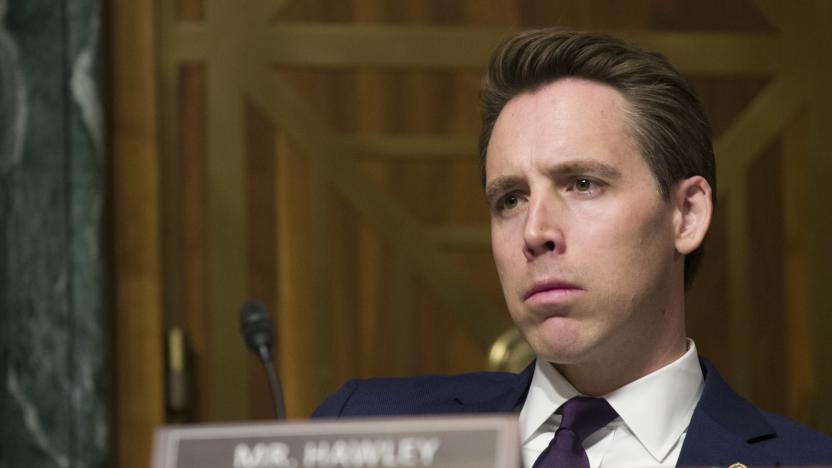
Senator wants to ban 'addictive' social network features in new bill
Never mind relying on your phone's wellbeing tools to curb your social network addictions -- if one congressman has his way, the law itself would step in. Senator Josh Hawley has introduced a bill, the Social Media Addiction Reduction Technology Act (yes, that's SMART Act), that would ban features deemed to be exploitative. It would primarily forbid infinite scrolling, autoplaying media and achievements that don't "substantially" reward users with more content. There would have to be "natural stopping points" that encourage users to take a break, for hat matter.

Intelligence Committee releases heavily redacted report on 2016 election hacking
Today the US Senate Select Committee on Intelligence released Vol. 1 of its report (PDF) on Russian attempts at election hacking in 2016. However, much of the information in it has already been released -- like knowledge that hacking attempts reached all 50 states in one form or another -- or is blacked out. As the New York Times notes, information redacted includes some of the key lessons for 2020.In public statements about the report, senators in both parties on the committee noted there is still work remaining to be done to ensure election security in 2020. Despite that, earlier today Senate Majority Leader Mitch McConnell blocked the consideration of election security bills. In response, Senator Ron Wyden said in a statement that "We shouldn't ask a county election IT employee to fight a war against the full capabilities and vast resources of Russia's cyber army. That approach failed in 2016 and it will fail again."Key Findings and Recommendations: The Russian government directed extensive activity against U.S. election infrastructure. The Committee found the activity directed at the state and local level began in at least 2014 and carried into at least 2017. The Committee has seen no evidence that any votes were changed or that any voting machines were manipulated. Russian efforts exploited the seams between federal authorities and capabilities, and protection for the states. The Department of Homeland Security (DHS) and Federal Bureau of Investigation (FBI) are, by design, limited in domestic cybersecurity authorities. State election officials, who have primacy in running elections, were not sufficiently warned or prepared to handle an attack from a hostile nation-state actor. DHS and FBI warnings to the states in the late summer and fall of 2016 did not provide enough information or go to the appropriate people. The Committee found that while the alerts were actionable, they provided no clear reason for states to take the threat more seriously than other warnings. DHS has redoubled its efforts to build trust with the states and deploy resources to assist in securing elections. Since 2016, DHS has made great strides in learning how election procedures vary across states and how to best assist those states. The Committee determined DHS's work to bolster states' cybersecurity has likely been effective but believes more needs to be done to coordinate efforts. Russian activities demand renewed attention to vulnerabilities in U.S. voting infrastructure. Cybersecurity for electoral infrastructure at the state and local level was sorely lacking in 2016. Despite increased focus over the last three years, some of these vulnerabilities, including aging voting equipment, remain. As states look to replace machines that are now out of date, they should purchase more secure voting machines. At a minimum, any machine purchased going forward should have a voter-verified paper trail. Congress should evaluate the results of the $380 million in state election security grants allocated in 2018. States should be able to use grant funds provided under the Help America Vote Act (HAVA) to improve cybersecurity in a variety of ways, including hiring additional IT staff, updating software, and contracting vendors to provide cybersecurity services. When those funds are spent, Congress should evaluate the results and consider an additional appropriation to address remaining insecure voting machines and systems. DHS and other federal government entities remain respectful of the limits of federal involvement in state election systems. America's decentralized election system can be a strength against cybersecurity threats. However, the federal government and states should each be aware of their own cybersecurity limitations and know both how and when to obtain assistance. States should remain firmly in the lead on running elections, and the federal government should ensure they receive the necessary resources and information. The United States must create effective deterrence. The United States should communicate to adversaries that it will view an attack on its election infrastructure as a hostile act and respond accordingly. The U.S. government should not limit its response to cyber activity; rather, it should create a menu of potential responses that will send a clear message and create significant costs for the perpetrator.
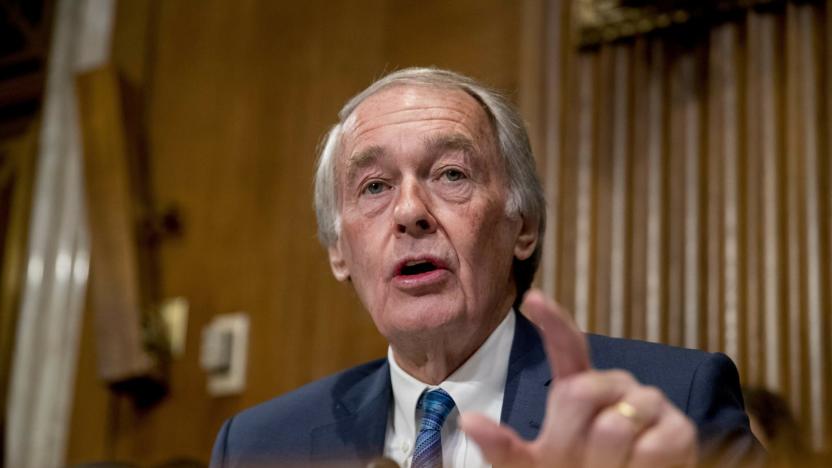
Senators grill FTC over reported $5 billion Facebook settlement
Facebook's reported $5 billion settlement with the FTC isn't even official yet, but that isn't stopping politicians from bristling at it. Senators Richard Blumenthal, Josh Hawley and Ed Markey (pictured) have sent a letter to the FTC requesting answers about the rumored settlement, expressing worries that the penalty would be "woefully inadequate" given privacy violations like the Cambridge Analytica affair. The questions cover not just the rationale behind the supposed deal, but the evidence gathering methods and punishments beyond the fine.

Congress tries to limit Trump's ability to ease Huawei restrictions
President Trump's desire to lift some restrictions on Huawei won't go unchallenged. A bipartisan group of senators has introduced a bill, the Defending America's 5G Future Act, that would effectively set the original blacklisting in stone. It would "codify" the executive order forbidding sales of telecom equipment to customers posing national security risks, bar the removal of Huawei from the Commerce Department Entity List without an act of Congress. It would also block waivers that any administration might offer to US companies doing business with Huawei.

Senate finds US agencies left security holes untouched for a decade
It's almost a truism to state that government IT security is frequently lacking, but a new Senate subcommittee report has underscored just how severe the problem is. Investigators found that several federal agencies (including the State Department, Homeland Security and the Social Security Administration) didn't adequately protect personal data, and that six of them hadn't installed security patches in a "timely" fashion to close vulnerabilities. In some cases, these flaws had lasted for roughly a decade or more.

Senator presses FTC to require stricter child protections from YouTube
Politicians aren't necessarily waiting for a formal investigation to ask YouTube to improve its policies on kids. Senator Ed Markey has sent a letter to the FTC warning that YouTube might have violated the Children's Online Privacy Protection Act (a law he co-authored) and calling for specific "safeguards" to protect kids if the Commission issues a consent decree. The measures would involve both tighter age controls as well as assurances that its products would be kid-safe.





